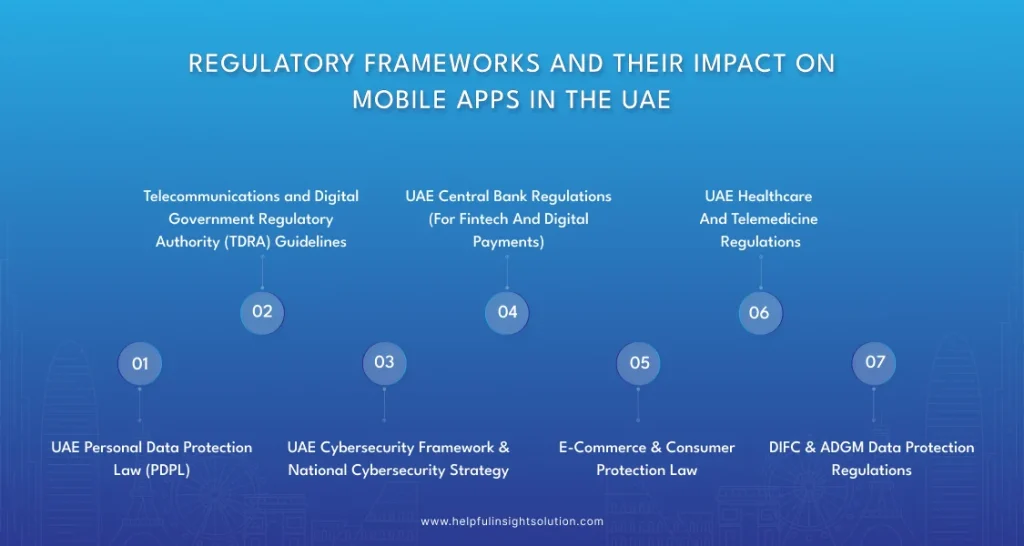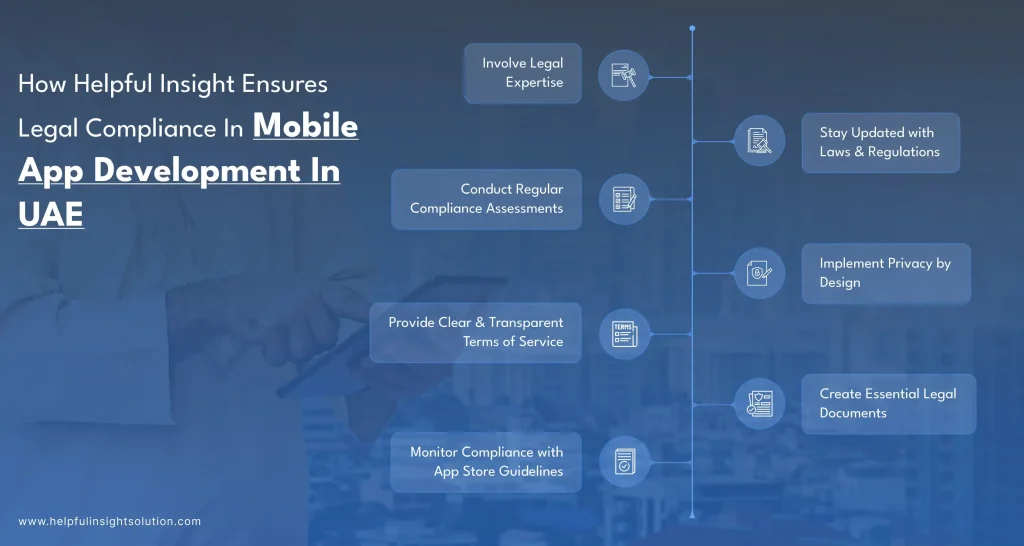Are you planning to launch a mobile app in the UAE? If yes then be ready to go through the complex web of rules and regulations. The regulatory frameworks of the Emerites’ government are recognized as being a stickler for data privacy regulations, making it essential for businesses to ensure unhinged compliance when dealing with customer information online. Businesses must focus on developing secure apps that unwaveringly adhere to applicable regulations for maximum protection.
In this blog, we will explore regulatory compliance for Mobile apps in the UAE and ways to construct a secure application that can withstand potential threats while providing users with safety and peace of mind in the UAE. We’ll also discuss things you need to consider for establishing a comprehensive security checklist that ensures optimum data security and app protection.
Overview of UAE’s Digital Regulatory Landscape
The UAE has positioned itself as a global leader in digital transformation, with a strong regulatory framework to ensure security, efficiency, and compliance in the digital economy. The government has enacted several laws to regulate e-commerce, fintech, cybersecurity, and data privacy, creating a structured environment for businesses and consumers. The UAE has embraced the digital era with the enactment of Federal Decree-Law No. 14/2023 on Trading by Modern Technological Means. This innovative law aims to regulate and reorganize e-commerce activities, fostering a favorable environment for digital trade.
Benefits of Legal Frameworks in Mobile App Development
There are abundant benefits of adhering to legal frameworks in mobile app development from scratch. We’ve jotted down a few major benefits of building a mobile app while sticking to legal considerations.
#1. Risk Mitigation
Complying with legal regulations helps minimize risks associated with contractual obligations and intellectual property rights. By addressing these legal issues proactively, developers can avoid costly legal disputes and reputational damage that may arise from non-compliance. This risk management approach not only protects the business but also enhances its long-term viability.
#2. User Trust
Legal compliance fosters confidence among users, creating a sense of credibility and security regarding how their information is handled. When users know that an app adheres to legal standards, they are more likely to engage with it, knowing their privacy is protected. This trust is crucial for user retention and can lead to positive word-of-mouth referrals.
#3. Market Access
Strict adherence to legal considerations can facilitate faster market access and quicker approval processes in app stores. Many apps face rejection due to non-compliance with legal standards or store guidelines. By ensuring compliance, developers increase the likelihood of their apps being launched successfully and without delays.
#4. Intellectual Property Protection
Legal frameworks provide mechanisms for developers to secure their intellectual property rights through trademarks, copyrights, and patents. This protection prevents unauthorized copying or imitation by competitors, allowing developers to maintain a competitive edge in the market. By leveraging IP laws, developers can confidently launch their apps while ensuring long-term security and exclusivity in the market.
#5. Data Privacy Compliance
Compliance with data protection regulations such as the General Data Protection Regulation (GDPR) and the California Consumer Privacy Act (CCPA) is essential for safeguarding user data. These frameworks guide developers in implementing necessary measures to protect sensitive information, ensuring transparency in data handling practices. Adhering to these regulations not only mitigates the risk of data breaches but also builds user confidence in the app’s commitment to privacy.
Regulatory Frameworks and Their Impact on Mobile Apps in the UAE

The UAE has established a strong regulatory ecosystem to ensure mobile applications meet security, privacy, financial, and consumer protection standards. These frameworks impact mobile app development, deployment, and operations, ensuring compliance with national and international laws.
1. UAE Personal Data Protection Law (PDPL)
Impact:
- Protects user data and privacy, requiring explicit consent for data collection.
- Regulates data processing, storage, and cross-border transfers.
- Aligns with GDPR, ensuring global compatibility for UAE-based apps.
Applicable to: All mobile apps handling personal data, including fintech, e-commerce, and healthcare apps.
2. Telecommunications and Digital Government Regulatory Authority (TDRA) Guidelines
Impact:
- Ensures secure and ethical digital transactions.
- Regulates content and communication in apps, including VIP and social media apps.
- Requires data localization for sensitive user information.
Applicable to: Communication, e-commerce, and social networking apps.
3. UAE Cybersecurity Framework & National Cybersecurity Strategy
Impact:
- Mandates end-to-end encryption and security measures to prevent cyber threats.
- Requires multi-factor authentication (MFA) for secure logins.
- Ensures compliance with threat detection and fraud prevention technologies.
Applicable to: All mobile apps, especially fintech, healthcare, and government apps.
4. UAE Central Bank Regulations (For Fintech & Digital Payments)
Impact:
- Ensures secure mobile banking and payment transactions.
- Enforces Know Your Customer (KYC) and Anti-Money Laundering (AML) guidelines.
- Requires compliance with Payment Card Industry Data Security Standard (PCI-DSS) for financial transactions.
Applicable to: Fintech apps, digital wallets, crypto exchanges, and banking apps.
5. E-Commerce & Consumer Protection Law
Impact:
- Protects consumers from fraudulent transactions and unfair practices.
- Requires clear policies for refunds, returns, and dispute resolution.
- Mandates transparent pricing and digital transaction security.
Applicable to: E-commerce, marketplace, and online service booking apps.
6. UAE Healthcare & Telemedicine Regulations
Impact:
- Ensures data confidentiality for patient health records.
- Regulates teleconsultations and AI-powered healthcare apps.
- Aligns with HIPAA-like security standards for medical apps.
Applicable to: Healthcare, wellness, and telemedicine mobile apps.
7. DIFC & ADGM Data Protection Regulations
Impact:
- Establishes data privacy compliance for international businesses in Dubai and Abu Dhabi.
- Requires data breach reporting and user consent for data processing.
- Helps fintech, e-commerce, and corporate apps align with global data security standards.
Applicable to: Fintech, corporate, and financial service apps operating within DIFC & ADGM zones.
Also Read:-How to Hire Mobile App Developers in Dubai: Cost and Key Steps
Key Regulatory Authorities Governing Mobile Apps
Several key authorities rule mobile app development in the UAE, ensuring compliance with laws and regulations that are set to protect the privacy and security of users’ sensitive information and promote fair practices in the digital landscape. Let’s take a closer look at the key authorities involved:
1. Telecommunications and Digital Government Regulatory Authority (TDRA)
The TDRA is the federal regulatory agency responsible for overseeing the telecommunications and digital sectors in the UAE. Established in 2003, it regulates the Information Communications and Telecommunications (ICT) sector, ensuring sustainability, competitiveness, and transparency among service providers. The TDRA implements regulations under the Telecommunications Law (Federal Law by Decree No. 3 of 2003) and is involved in developing the ICT regulatory framework, resolving disputes, and representing the UAE in international forums.
2. Ministry of Economy
The Ministry of Economy plays a crucial role in enforcing consumer protection laws related to e-commerce and mobile apps. It oversees compliance with regulations that safeguard consumer rights during digital transactions. The ministry also supports initiatives to enhance the business environment for digital services, ensuring that mobile app developers adhere to fair trading practices.
3. Data Protection Office
The data protection office deals with data privacy law enforcement in the UAE. this office ensures that mobile apps comply with legal requirements regarding the handling of data and user privacy, particularly under regulations such as the General Data Protection Regulation (GDPR) and other local data protection laws. Compliance with these regulations is highly important to maintaining user trust and avoiding legal penalties.
4. Consumer Protection Department
Part of the Ministry of Economy, this department focuses specifically on consumer rights within e-commerce. It develops regulations that protect consumers from unfair practices in mobile app transactions, including misleading advertising and unfair contractual terms.
5. Dubai Electronic Security Center (DESC)
For apps operating specifically within Dubai, the DESC provides guidelines on cybersecurity and data protection standards that must be adhered to by mobile app developers. This authority ensures that apps are secure and protect user data against breaches.
How Helpful Insight Ensures Legal Compliance In Mobile App Development In UAE

As a leading name in the mobile app development industry, we ensure legal compliance while developing mobile applications. Here‘s how we do it:
1. Involve Legal Expertise
Engaging legal professionals early in the app development process is essential. Their expertise helps identify potential legal pitfalls, such as issues related to intellectual property rights and contractual obligations. By having legal counsel involved from the outset, developers can proactively address compliance issues, reducing the risk of costly legal disputes later on.
2. Stay Updated with Laws & Regulations
The legal landscape is constantly evolving, with new regulations being introduced regularly. Developers must stay informed about these changes to ensure their apps remain compliant. This involves monitoring updates related to data protection laws, consumer rights, and industry-specific regulations, which can significantly impact app functionality and marketability.
3. Conduct Regular Compliance Assessments
Periodic assessments of the app’s compliance status are vital. By conducting comprehensive audits, developers can identify non-compliant areas and implement corrective measures promptly. Regular evaluations help maintain adherence to legal standards throughout the app’s lifecycle, ensuring ongoing compliance.
4. Implement Privacy by Design
Incorporating privacy considerations into the app’s architecture from the start is crucial for compliance with data protection regulations like GDPR and CCPA. This principle ensures that user data is handled securely and transparently, fostering user trust and minimizing the risk of data breaches.
5. Provide Clear & Transparent Terms of Service
Establishing clear terms of service is vital for managing user expectations and protecting the developer’s interests. These documents should outline acceptable use, limitations of liability, and user rights, thus providing a legal framework that governs interactions with users.
6. Create Essential Legal Documents
Developers should prepare key legal documents such as:
- Privacy Policy: Outlines how user data is collected, used, and protected.
- Terms and Conditions: Serves as a rulebook for app usage.
- End-User License Agreement (EULA): Governs how users can interact with the app.
7. Monitor Compliance with App Store Guidelines
Adhering to the specific guidelines set by app stores (like Google Play and Apple App Store) is critical for successful app approval. Many apps are rejected due to non-compliance with these guidelines; thus, staying aligned with both legal requirements and store policies enhances the chances of a smooth launch.
Conclusion
The above-provided details and information discusses regulatory compliance for mobile apps in the UAE. Investing in compliant mobile app development not only safeguards businesses from regulatory risks but also helps in building credibility and long-term success in the UAE’s digital landscape.











